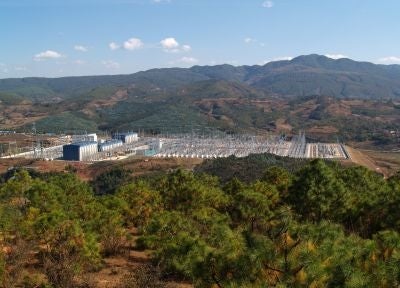Your support helps us to tell the story
From reproductive rights to climate change to Big Tech, The Independent is on the ground when the story is developing. Whether it's investigating the financials of Elon Musk's pro-Trump PAC or producing our latest documentary, 'The A Word', which shines a light on the American women fighting for reproductive rights, we know how important it is to parse out the facts from the messaging.
At such a critical moment in US history, we need reporters on the ground. Your donation allows us to keep sending journalists to speak to both sides of the story.
The Independent is trusted by Americans across the entire political spectrum. And unlike many other quality news outlets, we choose not to lock Americans out of our reporting and analysis with paywalls. We believe quality journalism should be available to everyone, paid for by those who can afford it.
Your support makes all the difference.Innovative technology used in a Chinese ‘electrical highway' could provide the solution to Europe's energy problems and ensure cheaper electricity for consumers.
Sustainable power project DESERTEC aims to provide the European Union (EU), the Middle East (ME) and North Africa (NA) with electricity generated from large concentrations of solar panels located in the deserts of North Africa and the Middle East.
The EU, working in close cooperation, with MENA aims to create a network of long distance power lines carrying solar power from the deserts of Africa into Europe; because the electricity is generated by solar power it would be available at a lower cost than power generated by conventional sources, which are subject to rising prices relating to supply and demand issues.
Currently the technology needed to transport electricity from the desert to households in Europe is unavailable due to the large amount of power lost in transporting power over such a distance. Currently about 3 percent of electricity is lost per 1000 km of cables meaning 15 percent of power generated in the desert would be lost before it reached Europe.
However electrical company Siemens announced on August 1 the successful operation of an innovative 'electric highway in China.' The electricity carried by this highway is generated by hydropower and then transported 1,500 km from Yunnan province to the industrial heartland of Guangzhou and Shenzhen. This ‘electric highway' uses a new transformer capable of carrying 800kv, a world first in the field of power generation; this transformer ensures that less than 2 percent of power is lost in transport and the cost of electricity remains low for the Chinese consumers.
It is estimated that the successful implementation of technologies similar to those used in China for the DESERTEC project could reduce the cost of electricity to 3/4 euro cents per kWh (kilowatt hour). European statistic database Eurostat currently estimates the average cost of electricity for the household consumer at around 12 euro cents per kWh; electricity is most expensive for householders in Ireland at 18 euro cents per kWh and cheapest for Bulgarians at 6.8 euro cents per kWh.
As well as financial benefits, projects such as the one in China and DESERTEC also have huge environmental bonuses; Siemens estimate that the ‘eclectric highway' reduces CO2 emissions by 30 million tons per year, and DESERTEC would hugely reduce Europe's reliance on fossil fuels.

Join our commenting forum
Join thought-provoking conversations, follow other Independent readers and see their replies
Comments